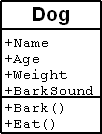Difference between revisions of "Intro Week 9"
m (Text replacement - "<csharp>" to "<syntaxhighlight lang="csharp" line="1" >") |
m (Text replacement - "syntaxhighlight lang="csharp" line="1" " to "syntaxhighlight lang="csharp"") |
||
| Line 40: | Line 40: | ||
[[Image:DogSimpleUML.png]] | [[Image:DogSimpleUML.png]] | ||
| − | <syntaxhighlight lang="csharp | + | <syntaxhighlight lang="csharp">//Dog simple class definition |
public class Dog | public class Dog | ||
{ | { | ||
| Line 59: | Line 59: | ||
Now lets make some instances of the dog class | Now lets make some instances of the dog class | ||
| − | <syntaxhighlight lang="csharp | + | <syntaxhighlight lang="csharp">// Instantiate Dog objects |
// Declare an instance of the Dog class | // Declare an instance of the Dog class | ||
Dog firstDog; | Dog firstDog; | ||
Latest revision as of 03:20, 9 February 2016
Contents
OOP Classes and Objects
Classes are sections of code that describe real world objects. Classes define what properties and methods an object contains. Properties
- define data members of classes. Nouns
Abstraction
Humans are always abstracting and naming objects. It is how we identify things. Objects are identified by two things: properties(what the have) and methods (what they do).
Classes are used to define objects.
The hardest part about object oriented programming is choosing how to build and implement these abstractions.
Methods
- define what classes can do. Verbs
Dog Class UML
Objects are instances of classes. For instance a Dog class may describe what dogs are like.
All dogs have specific properties like height, weight, color. Dog also have methods like bark. My dog rover is a specific instance of the dog class.
Dog Class
Fields
Microsoft has started call ing public variables fields
- string Name
- int Age
- int Weight
- string BarkSound
Methods
- Bark
- Eat
Dog Class UML
//Dog simple class definition
public class Dog
{
public string Name; // the dog's name
public int Age; // the dog's age
public int Weight; // the dog's weight
public string BarkSound; // the sound of the dog's bark
public string Bark() {
return BarkSound;
}
public void Eat() {
//put eat code here
}
}
Now lets make some instances of the dog class
// Instantiate Dog objects
// Declare an instance of the Dog class
Dog firstDog;
// Allocate memory for the dog object
firstDog = new Dog();
// Declare and Allocate in one like
Dog secondDog = new Dog();
The new keyword call the classes constructor which allocated memory on the stack for the object. </syntaxhighlight>
In Class
Make and compile a Cat class with a test class. *Draw UML for the Cat Class *Write test class *Compile and test test class *Make Dog class *Test Dog class with test class
